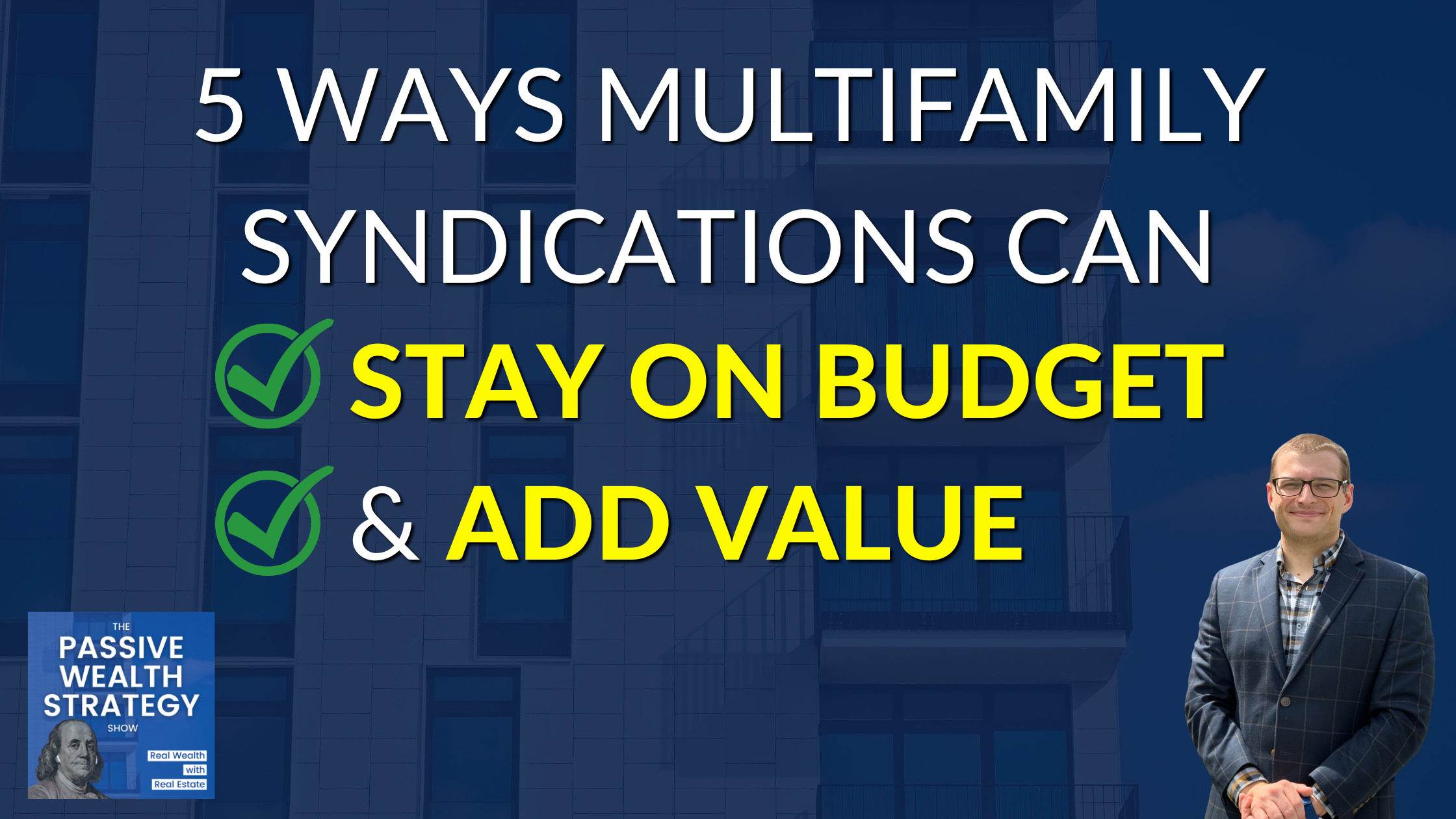One of the biggest challenges in doing real estate investing is getting started. It makes you wonder if the stories about creating passive wealth are real. Phoenix O’Rourke is a true passive real estate success story! He is a police officer by trade, based in California. Over the last few years he has invested heavily in single family turnkey properties. This is the story of his success and what you can learn from his experience.
—
Turnkey Success: Passive Single-Family Investing with Phoenix O’Rourke
Our guest is Phoenix O’Rourke. He is a current police officer, a single-family investor and soon to be a multifamily real estate investor. He’s a young guy who just had his first kid. We’re going to learn about his experience taking advantage of some hands that he’s been dealt and killing it and I’m excited for what he’s been doing. Without further ado, Phoenix, welcome on the show.
Taylor, thanks for having me. I appreciate it.
I’m happy to talk to you again. When we first met years ago, you were telling me about how you’re getting into single-families and how you got your initial star. For our readers, can you tell them about what got you into single-family investing?
I’m giving you an overview of what happened back in 2015, my wife and I bought our first house here in San Mateo, California. We bought it for $609,000. We waited a couple of years and in those two years, I started learning about several podcasts, The Real Estate Guys and Get Rich Education with Keith Weinhold. I realized that maybe owning our own house wasn’t the exact thing that we needed to do at that current time. Fast forward to January of 2016, it was a good time in the market here in the Bay Area, California. We sold it for a nice profit in the mid-800s. My wife and I took all that money and started buying single-family homes in the Midwest and South. That’s pretty much our story in a nutshell.
You moved from making an appreciation game and you got into cashflow. We’re all about cashflow here at Passive Wealth Strategies. What has that been like you buying turnkeys? You mentioned Keith Weinhold and his show. It’s a great show and the Real Estate Guys too. Is that how you got into investing in the Midwest?
It’s funny because I heard about Keith Weinhold through a coworker and he came from another department. Cops talk a lot and when he came into our department, he was supposedly a millionaire. I’m thinking to myself, “Why is this guy a millionaire and being a cop at the same time?” One day I asked him, “What do you do?” Surprisingly enough, he told me that he was into stocks. I was like, “I’ll get into stocks because I want to be a millionaire too.” He said, “I actually wouldn’t do what I do. I’m about to get out of the stock market and go into real estate. You should check out Keith Weinhold’s podcast.” That’s how I got a lead on or turned on to Keith and his show.
You learn as you go. You don't know what you don't know until you do something wrong. Click To TweetFrom there, I just listened to every single episode. From listening to his episodes, I heard about The Real Estate Guys and from there, I heard about Rod Khleif. I branched out and started doing my own research. I read all of Robert Kiyosaki’s books. From there, I heard about the turnkey companies, Mid South Home Buyers and AREI USA over in Texas and some other guys. I started investing four different cities and I started building our portfolio slowly but surely. After a few houses, I met you over at The Real Estate Guys’ Secrets of Successful Syndication event and realize I still want it to keep on going because at that point I was a little bit of a pause in my life. My wife and I were at a pause in buying houses because we weren’t exactly sure if we want to keep on buying turnkeys or buy our own house here in the Bay Area. We decided the right thing to do was to keep on buying turnkeys and I think the right move for our family.
Especially over time, it’s going to be more apparent that it was the right move to make. I certainly applaud you for that. We were talking before we started some of the things that you’re doing right now with your portfolio. I think it’s interesting to talk about the experience of someone. You have a pretty extensive experience I would say in investing in turnkey real estate by now. How many have you got in your portfolio right now?
I’ve got twelve units and thirteen doors, eleven single-family homes and one duplex.
To get a little more perspective, how old are you?
I’m 29 years old.
How many 29 years old out there can say they owned thirteen doors? I applaud you a lot for that. You were telling me about some of the things that you’re up to regarding refinancing and operating the properties. After you buy it and the honeymoon phase is over of you owning your first couple of turnkey rentals, what is that experience like?

Is it after buying it and seeing that the checks come in each month?
Yes.
I’m not going to lie. When my wife and I started first doing this, we weren’t sure if it was like a Ponzi scheme or a pyramid scheme or some type of scam. We bought three right away. We sold our house here in the Bay Area in January of ‘16 and we bought our first investment property in January of ‘16. We bought our second one in February of ‘16 and our third one in March of ‘16. After those three, we put 20% down in all these houses. We made sure that this is a real thing. These houses are in our name and this isn’t going to someplace in Nicaragua or something like that. Sure enough, the rent checks kept on coming in. We obviously went to the county websites and saw our name. They’re on the title and we’re like, “We’re pretty sure this is real.” After those three, that’s when we hit that pause button quick and saw you at that Secrets of Successful Syndication event.
We went there and that’s when we decided there’s no doubt we need to keep on doing this. This is the real deal and we started to put our money. To answer your question, you don’t believe it until you do it and then you see it coming in. On top of the cashflow coming in, I gave all my info, the monthly mortgage statements to my tax advisor and he wrote everything off for me, which was awesome. I’m seeing three years later now, that first house I ever bought and go from $85,000 to it could sell for about $122,000 now. It’s mind-boggling to me. I wish I would have bought more sooner is what I’m trying to say. It’s an amazing feeling to have.
The key is that you’re investing for cashflow and the appreciation that you’re making is the icing on the cake. It sounds like you are looking at it that way.
You don’t even realize it because you’re so happy about the cashflow that you are getting and the tax benefits at the end of the year. All of a sudden, you look on Zillow one day and you’re like, “The house that you bought three years ago at $85,000, now you’re telling me it’s at around $120,000, $125,000.” The house that my wife and I bought over in Garland, Texas for $152,000 is now worth $200,000 and you’re just scratching your head, “Why does not everyone do this?”
One of the worst mistakes is assuming that everyone is equally reputable. Click To TweetIt’s harder than clicking buttons. You have to take some initiative and you have to take some risks. You have to be willing to do the hard things in some ways. Definitely, you deserve a lot of credit for that. As far as preparing for the long-term and preparing for things like what if you have an AC unit go out in the summer or when your tenant has a problem with the toilet, what are they going to do? How do you handle that?
Don’t get me wrong, it’s not all sunshine and rainbows all the time. I was emailing back and forth my property manager in Kansas City about a tenant that broke his lease early and was supposed to stay at least until March and now he’s moving out. We are trying to catch up with payments. I’m not going to sit here and tell you that you buy this house and you can look away and never do anything or have to worry about it ever again. That’s not the case. When you build your portfolio and you have so many units, the other units started taking care of the one down unit every so often and the other units take care of the AC unit that has a little bit of a problem one month that needs to get fixed and so on and so forth. I divvy out all of my properties to property management companies out there. I’m not going to invest or manage all these properties in Memphis, Tennessee, in Kansas City, in Indianapolis and Texas from California. There’s just no way. They take care of it and they charge a fee but it’s well worth it and well worth my time, headache and all that. It’s a little roller coaster but the highs are much higher than the lows. That’s for sure.
In the multifamily world where I’m coming from, the way we think about working with our property managers is very much that they’re the ones that are going to make or break your deal as long as you don’t make or break your own deal. They’re running the property. They’re managing the renovations. They’re putting the right tenants and all of that. When you first got started, you’re not coming from a professional real estate investment background. You’re getting started. You’re trying to learn these things. Learning how to manage your property manager, what has that have been like? Have you learned any hard lessons? If we can be totally open here, have you made any mistakes in that regard that maybe our audience can learn from it?
You learn as you go. You don’t know what you don’t know until you do something wrong pretty much because you don’t know what you don’t know when you do something right. You just figured out that’s how it always goes. For example, when you have a turn, someone moves out and the property manager sends you a list of things that they think should be taken care of. For example, one of my properties that turned or actually is in the middle of turning right now, they sent me a big old list for $2,000 worth of stuff that they need to be repaired. First of all, I looked at that list and I saw all of these are owner charges and none of them are tenant charges. I see things on the list such as damage to the walls because of the doorknobs or shelves that are loose and broken. I think to myself, “I don’t think I should be paying for that. I didn’t break the wall. I didn’t make the shelf come off or anything like that.” I emailed them back. Going back, first of all, when I first did a turn I was like, “There’s a bill. Here’s all the money. There you go,” and I’m angry at myself that why is this costing so much?
I didn’t think to myself that I need to communicate with my property manager. I need to manage my property manager into realizing that I don’t want this to be the “spectacular everything is in perfect condition” house. I want it to be operable. I want to be safe, I wanted to be sound, but that doesn’t mean I need to spend $2,000. Fast forward to current time, I emailed them back and I told them, “Thank you for the list. I see that the walls are broken, but I don’t think I should be charged for that. That should be coming out of the tenants’ rent deposit. I see that the shelves are off and I don’t understand why you’re again charging me. I think that should be part of the tenants who broke it.” It’s healthy conversations and emails with your property manager that you have to go through. They sure enough emailed me back, “Sorry about that. We totally missed that. We will charge the tenant for that and here’s an updated list of what your charges are compared to what the tenant’s.” That $2,000 number went down to about $1,100,” and it was $900 saved right there. I take that $1,100 and I said, “What do I need off that list that is going to make it rent ready and make it maybe rent a little bit at or above market value?”
They want to repaint all of the walls, all of the doors. When people go in to see a house, maybe they want fresh paint, but if the paint is okay, that’s not a big deal to them. If there’s a crack in the caulking behind the sink for example, that’s a big deal. I went ahead and cut that list into the half pretty much so $2,000 bill went down to about $500, which again in the long run, it’s $500 which sucks. You’re out of rent check for that month and you’re paying $500, but at the same time you’ve got to remember that these are the houses that my wife and I have that are covering for that $500 and the mortgage. It is lengthy and I apologize for going on for so long but you do need to learn how to manage your manager for sure. They will assume that you live and you own this investment property and you must have millions upon millions of dollars and you can pay for anything, which obviously we know is not the case. We want to manage it the best we can.

As far as next steps for you, you and I met at Secrets of Successful Syndication, The Real Estate Guys event. We’re both gently pushing forward through mavericks and apartment investing. Where are you now? What’s next for you and how can our readers learn more about you?
My wife and I are at the stage where we hit the pause button on buying turnkey single-family homes out of our own budget like we were doing. We’re saving up now trying to get liquid and go for bigger deals. I joined a mentorship group with Mark Kenney who runs Think Multifamily out of Texas area. I’m just trying to educate myself on trying to understand the differences between single-family and multifamily, which are a ton. I’m sure as you well know now and a whole different process of loans and the way that they’re appraised. How you would go about purchasing them with the LOIs. I’ve been in the mentorship for a little over a year now. I still have no deals under my belt but I’m taking it slowly.
I had a daughter in April and I’m devoting all my time to her. I’m back to a patrol life, whereas before I was undercover for three years. It’s a little change in life and trying to understand the multifamily game and trying not to suffer from paralysis analysis. I got to tell myself to do what I did when I first started investing, which is to dive in. You don’t know what you don’t know until you do it and go from there. My goal is to start off somewhat slow. We let around a 50-unit to 80-unit apartment deal, start building relationships to raise money, start building relationships to get deals coming into the email account, building a website and going from there.
Phoenix, what is the best investment you’ve ever made?
I think a lot of people would obviously start out with saying the first property that I ever bought for $85,000 that’s now $120,000 or $125,000. Honestly, if I could tell my younger me, the 21-year-old once a straight out of college, “Listen and read every single book, podcast to enhance your knowledge, to know what you’re talking about and to know how to take action.” Knowledge I would say is the answer to that one.
What is the worst investment you’ve ever made?
Real estate is a people business. Click To TweetIt is not doing due diligence on one of my turnkey providers and the guy who did the flip and put the tenant in there and having success with the first guy. It is trusting that the entire turnkey process was the same with everybody and not doing my homework. It comes down to knowledge where I didn’t know what I was doing and trusted somebody. I forget who says it but it’s basically, “Trust what the person is telling you but make sure you confirm it.”
I think that was Ronald Reagan regarding The Soviets in the ‘80s. We’re going to trust but verify that they are deescalating. It sounds like if I’m hearing correctly, you had a good couple turnkey transactions of it with one particular provider and then you bought another deal from someone else. You made the assumption that everyone was equally reputable and that was not the case.
That is exactly right.
This is my favorite question of all these three. What is the most important lesson that you’ve learned in investing?
Relationships is 100%. You can have deals come into your mailbox and you can analyze deals all day, every day. The numbers are numbers, unless you know somebody personally. It doesn’t have to be you fly out from New York, California or Texas to meet the broker in Indianapolis but you get on the phone with the turnkey providers. You talk to them, you’re respectful and you basically build trust and almost a friendship to where you can trust them. Therefore, you can cater your investments towards what fits you and your family the best.
I think it’s a very important answer because real estate, especially is definitely a people business, whether you’re looking for service providers as you are in one capacity or another. Building relationships with investors, which you also mentioned is a part of your future in apartment investing. Great relationships are very important. Is there anything that you’d like to share with the audience that we haven’t touched on? Either your experience with turnkey investing or as you’re getting into the apartment game and your experience there?

I think I said it already but I’ll reemphasize. You’ve got to take action 100%. I’ve heard it in thousands of podcasts that I’ve listened to and read about and if you don’t take the action, if you sit behind the computer all day or put your earphones on and listen to books all day, it is really good. You do become very knowledgeable, but it is so true when they say that unless you do something, you’re not going to learn as fast. Whether that even means being a passive investor in somebody’s deal, that let’s say someone’s buying an apartment complex for 100 units and you invest passively, you’re still going to learn a lot by doing that.
You get all the documents, you’ll see your monthly payments come in and you’ll see how the process goes but if you never do it, you’ll never know. The same thing goes for single-family. If you never buy a single-family house, then you’ll never know how the process works if it’s for you or not. Worst case scenario is you buy one single-family house for $65,000 for 20% down. I’m not good at math but that’s going to be around $17,000, $18,000, $19,000 after closing cost and everything else and you’re like, “This isn’t for me. I need to do something else.” You wait a year or whatever or you sell it to another investor and you get all your money back. You might take a small little hit or you might not because of the equity that you gain and then you go from there. You’re never going to learn unless you do. That’s the biggest thing that I’ve taken away from this entire process.
How can our audience get to learn more about how to turnkey investing or keep in touch with you as you drive headlong to apartments or maybe if they want to be an undercover cop in the future?
Either way, give me a call or email me. I’m more than happy to talk to any of your audience. You can email me at [email protected]. You can call me or text message me, whatever you feel comfortable with at (650) 766-6308. That’s my personal cell phone number. I am a cop and I am working on the West Coast. I’m up until about 2:00 AM my time. If you’re in New York and you’re like, “I get up at 4:30 to go to work, hit me up. I’ll be awake at 1:30, 4:30 of your time.” I’d love to talk to anybody that has some questions.
Phoenix, it’s been great talking to you again. It’s been a little while since we chatted. I’m confident that our audience or anyone is interested in turnkeys has learned a lot. I encourage them to reach out to you. I suggest they send an email or shoot you a text, give you a call or anything. I want to thank everyone for tuning. If you are enjoying the show, please leave us a rating and a comment on iTunes. That’s a big help. If you know anyone that would benefit from the information we’re providing here whether about single-family, turnkeys or any types of investing that we talked about, send them a link. Bring them into the fold and bring them onto our team so they can learn more about passive investing. I’ll talk to you on the next one.
Important Links:
- Phoenix O’Rourke
- The Real Estate Guys
- Get Rich Education
- Mid South Home Buyers
- AREI USA
- Secrets of Successful Syndication
- Think Multifamily
- [email protected]
- Passive Wealth Strategies for Busy Professionals on iTunes
About Phoenix O’Rourke






